Optimizing Ship Management Operations in a Competitive Industry
VerifiedAdded on 2020/12/24
|43
|11741
|444
Project
AI Summary
This project analyzes the operations of ship management companies, focusing on how they can improve their efficiency and reduce costs within a competitive industry. The research delves into various aspects of ship management, including crewing, technical management, and financial strategies. It explores best practices in crewing, such as investing in culture and teamwork, and providing crew welfare packages. In technical management, the project highlights the importance of hull maintenance and condition-based maintenance. Furthermore, it examines the integration of operations with finance and the importance of cash management. The project also investigates strategic management, including goal setting and the implementation of plans to achieve success. The research questions address how ship management companies can optimize their operations, the factors affecting costs, and the strategies used during economic downturns. The aim of the project is to analyze how ship management companies can improve their operations, manage vessels effectively, and remain competitive by optimizing costs. The project also includes a literature review, methodology, findings, discussion, recommendations, and areas for further study.
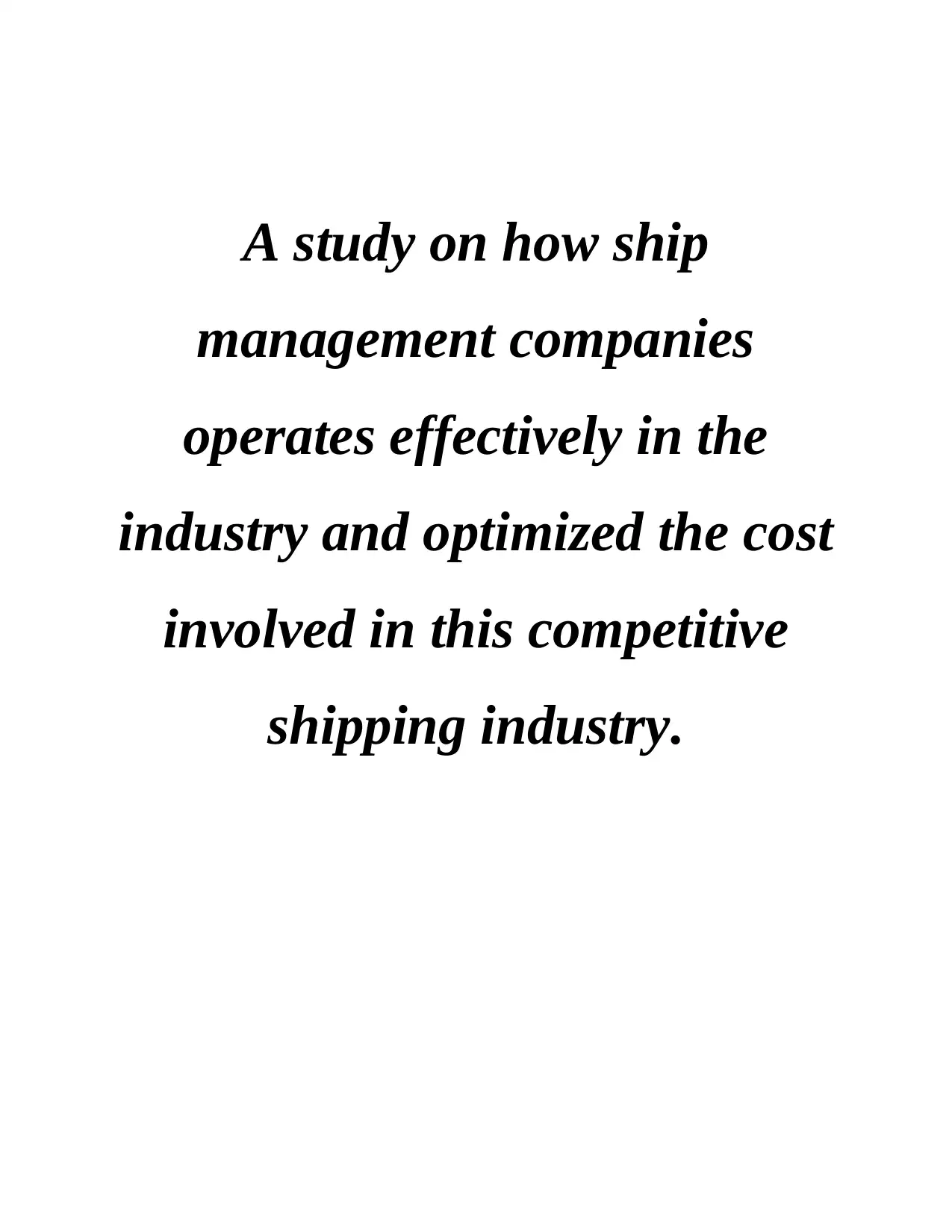
A study on how ship
management companies
operates effectively in the
industry and optimized the cost
involved in this competitive
shipping industry.
management companies
operates effectively in the
industry and optimized the cost
involved in this competitive
shipping industry.
Paraphrase This Document
Need a fresh take? Get an instant paraphrase of this document with our AI Paraphraser

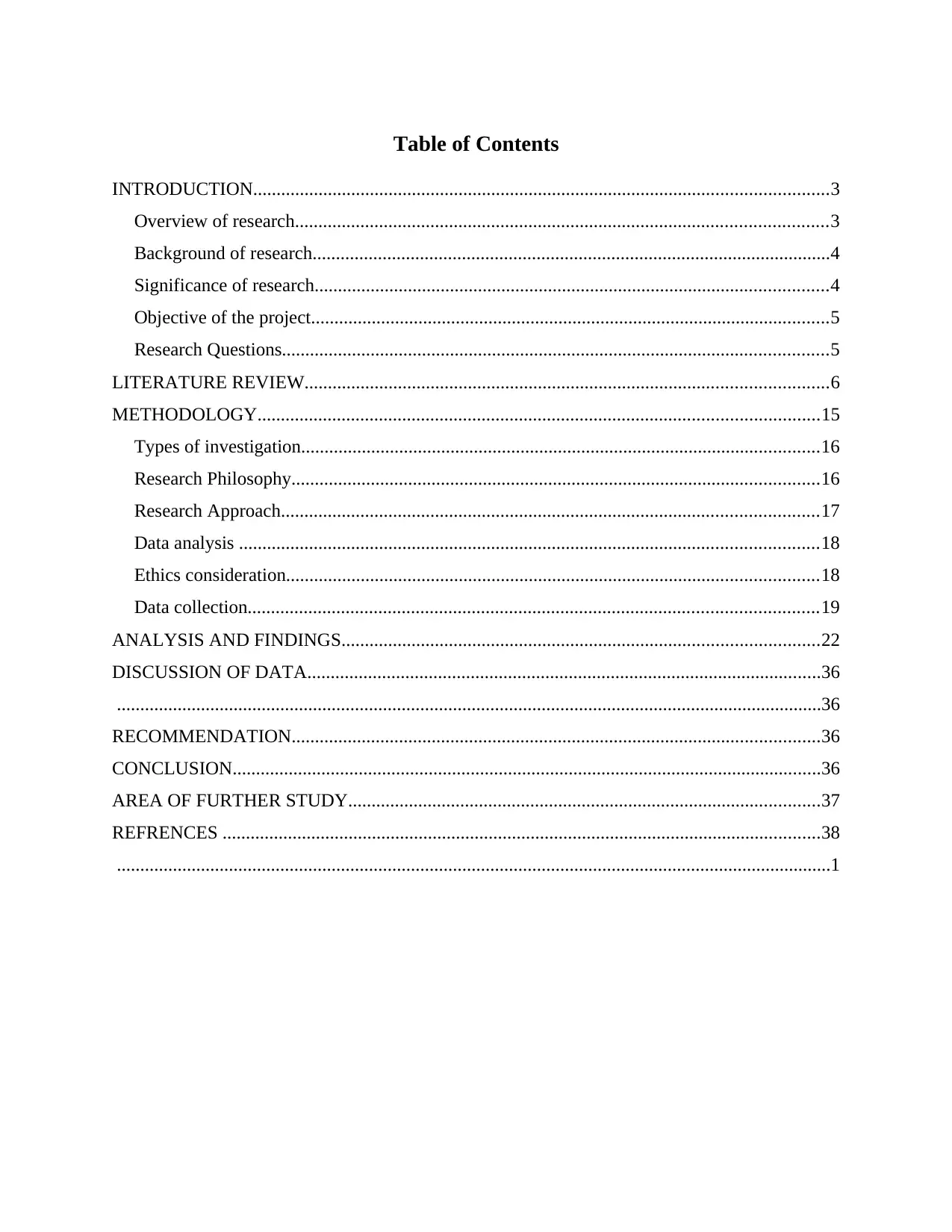
Table of Contents
INTRODUCTION...........................................................................................................................3
Overview of research..................................................................................................................3
Background of research...............................................................................................................4
Significance of research..............................................................................................................4
Objective of the project...............................................................................................................5
Research Questions.....................................................................................................................5
LITERATURE REVIEW................................................................................................................6
METHODOLOGY........................................................................................................................15
Types of investigation...............................................................................................................16
Research Philosophy.................................................................................................................16
Research Approach...................................................................................................................17
Data analysis ............................................................................................................................18
Ethics consideration..................................................................................................................18
Data collection..........................................................................................................................19
ANALYSIS AND FINDINGS......................................................................................................22
DISCUSSION OF DATA..............................................................................................................36
.......................................................................................................................................................36
RECOMMENDATION.................................................................................................................36
CONCLUSION..............................................................................................................................36
AREA OF FURTHER STUDY.....................................................................................................37
REFRENCES ................................................................................................................................38
.........................................................................................................................................................1
INTRODUCTION...........................................................................................................................3
Overview of research..................................................................................................................3
Background of research...............................................................................................................4
Significance of research..............................................................................................................4
Objective of the project...............................................................................................................5
Research Questions.....................................................................................................................5
LITERATURE REVIEW................................................................................................................6
METHODOLOGY........................................................................................................................15
Types of investigation...............................................................................................................16
Research Philosophy.................................................................................................................16
Research Approach...................................................................................................................17
Data analysis ............................................................................................................................18
Ethics consideration..................................................................................................................18
Data collection..........................................................................................................................19
ANALYSIS AND FINDINGS......................................................................................................22
DISCUSSION OF DATA..............................................................................................................36
.......................................................................................................................................................36
RECOMMENDATION.................................................................................................................36
CONCLUSION..............................................................................................................................36
AREA OF FURTHER STUDY.....................................................................................................37
REFRENCES ................................................................................................................................38
.........................................................................................................................................................1
⊘ This is a preview!⊘
Do you want full access?
Subscribe today to unlock all pages.

Trusted by 1+ million students worldwide
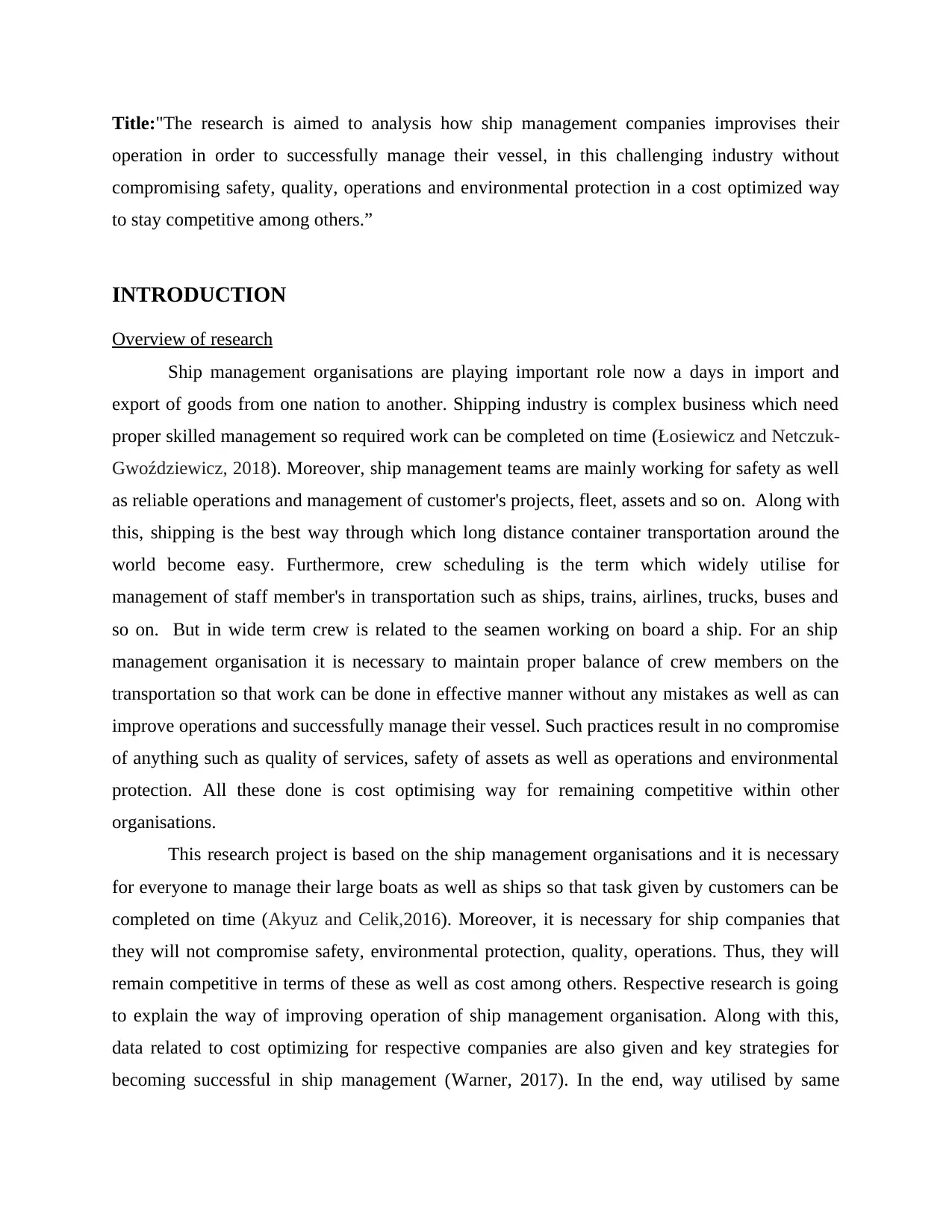
Title:"The research is aimed to analysis how ship management companies improvises their
operation in order to successfully manage their vessel, in this challenging industry without
compromising safety, quality, operations and environmental protection in a cost optimized way
to stay competitive among others.”
INTRODUCTION
Overview of research
Ship management organisations are playing important role now a days in import and
export of goods from one nation to another. Shipping industry is complex business which need
proper skilled management so required work can be completed on time (Łosiewicz and Netczuk-
Gwoździewicz, 2018). Moreover, ship management teams are mainly working for safety as well
as reliable operations and management of customer's projects, fleet, assets and so on. Along with
this, shipping is the best way through which long distance container transportation around the
world become easy. Furthermore, crew scheduling is the term which widely utilise for
management of staff member's in transportation such as ships, trains, airlines, trucks, buses and
so on. But in wide term crew is related to the seamen working on board a ship. For an ship
management organisation it is necessary to maintain proper balance of crew members on the
transportation so that work can be done in effective manner without any mistakes as well as can
improve operations and successfully manage their vessel. Such practices result in no compromise
of anything such as quality of services, safety of assets as well as operations and environmental
protection. All these done is cost optimising way for remaining competitive within other
organisations.
This research project is based on the ship management organisations and it is necessary
for everyone to manage their large boats as well as ships so that task given by customers can be
completed on time (Akyuz and Celik,2016). Moreover, it is necessary for ship companies that
they will not compromise safety, environmental protection, quality, operations. Thus, they will
remain competitive in terms of these as well as cost among others. Respective research is going
to explain the way of improving operation of ship management organisation. Along with this,
data related to cost optimizing for respective companies are also given and key strategies for
becoming successful in ship management (Warner, 2017). In the end, way utilised by same
operation in order to successfully manage their vessel, in this challenging industry without
compromising safety, quality, operations and environmental protection in a cost optimized way
to stay competitive among others.”
INTRODUCTION
Overview of research
Ship management organisations are playing important role now a days in import and
export of goods from one nation to another. Shipping industry is complex business which need
proper skilled management so required work can be completed on time (Łosiewicz and Netczuk-
Gwoździewicz, 2018). Moreover, ship management teams are mainly working for safety as well
as reliable operations and management of customer's projects, fleet, assets and so on. Along with
this, shipping is the best way through which long distance container transportation around the
world become easy. Furthermore, crew scheduling is the term which widely utilise for
management of staff member's in transportation such as ships, trains, airlines, trucks, buses and
so on. But in wide term crew is related to the seamen working on board a ship. For an ship
management organisation it is necessary to maintain proper balance of crew members on the
transportation so that work can be done in effective manner without any mistakes as well as can
improve operations and successfully manage their vessel. Such practices result in no compromise
of anything such as quality of services, safety of assets as well as operations and environmental
protection. All these done is cost optimising way for remaining competitive within other
organisations.
This research project is based on the ship management organisations and it is necessary
for everyone to manage their large boats as well as ships so that task given by customers can be
completed on time (Akyuz and Celik,2016). Moreover, it is necessary for ship companies that
they will not compromise safety, environmental protection, quality, operations. Thus, they will
remain competitive in terms of these as well as cost among others. Respective research is going
to explain the way of improving operation of ship management organisation. Along with this,
data related to cost optimizing for respective companies are also given and key strategies for
becoming successful in ship management (Warner, 2017). In the end, way utilised by same
Paraphrase This Document
Need a fresh take? Get an instant paraphrase of this document with our AI Paraphraser
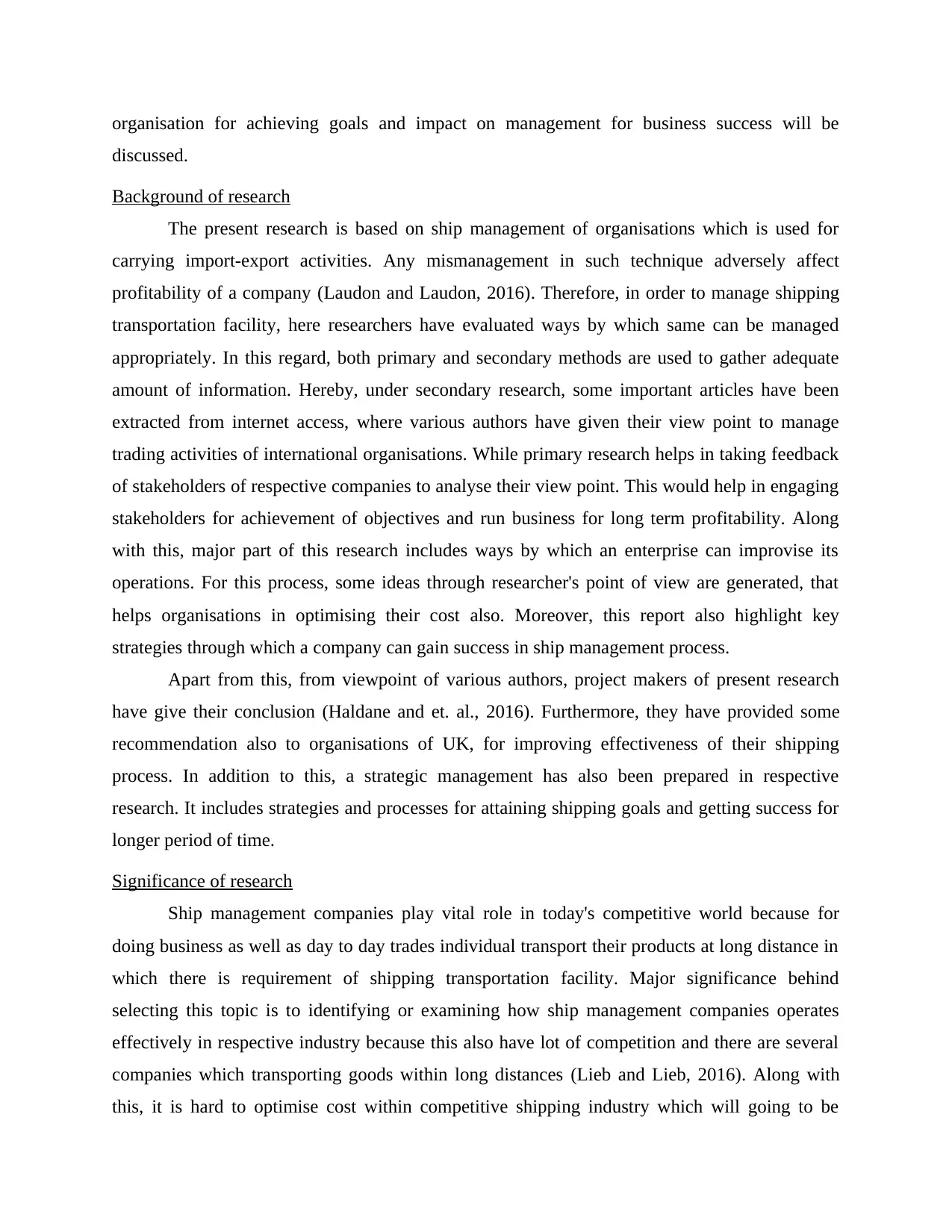
organisation for achieving goals and impact on management for business success will be
discussed.
Background of research
The present research is based on ship management of organisations which is used for
carrying import-export activities. Any mismanagement in such technique adversely affect
profitability of a company (Laudon and Laudon, 2016). Therefore, in order to manage shipping
transportation facility, here researchers have evaluated ways by which same can be managed
appropriately. In this regard, both primary and secondary methods are used to gather adequate
amount of information. Hereby, under secondary research, some important articles have been
extracted from internet access, where various authors have given their view point to manage
trading activities of international organisations. While primary research helps in taking feedback
of stakeholders of respective companies to analyse their view point. This would help in engaging
stakeholders for achievement of objectives and run business for long term profitability. Along
with this, major part of this research includes ways by which an enterprise can improvise its
operations. For this process, some ideas through researcher's point of view are generated, that
helps organisations in optimising their cost also. Moreover, this report also highlight key
strategies through which a company can gain success in ship management process.
Apart from this, from viewpoint of various authors, project makers of present research
have give their conclusion (Haldane and et. al., 2016). Furthermore, they have provided some
recommendation also to organisations of UK, for improving effectiveness of their shipping
process. In addition to this, a strategic management has also been prepared in respective
research. It includes strategies and processes for attaining shipping goals and getting success for
longer period of time.
Significance of research
Ship management companies play vital role in today's competitive world because for
doing business as well as day to day trades individual transport their products at long distance in
which there is requirement of shipping transportation facility. Major significance behind
selecting this topic is to identifying or examining how ship management companies operates
effectively in respective industry because this also have lot of competition and there are several
companies which transporting goods within long distances (Lieb and Lieb, 2016). Along with
this, it is hard to optimise cost within competitive shipping industry which will going to be
discussed.
Background of research
The present research is based on ship management of organisations which is used for
carrying import-export activities. Any mismanagement in such technique adversely affect
profitability of a company (Laudon and Laudon, 2016). Therefore, in order to manage shipping
transportation facility, here researchers have evaluated ways by which same can be managed
appropriately. In this regard, both primary and secondary methods are used to gather adequate
amount of information. Hereby, under secondary research, some important articles have been
extracted from internet access, where various authors have given their view point to manage
trading activities of international organisations. While primary research helps in taking feedback
of stakeholders of respective companies to analyse their view point. This would help in engaging
stakeholders for achievement of objectives and run business for long term profitability. Along
with this, major part of this research includes ways by which an enterprise can improvise its
operations. For this process, some ideas through researcher's point of view are generated, that
helps organisations in optimising their cost also. Moreover, this report also highlight key
strategies through which a company can gain success in ship management process.
Apart from this, from viewpoint of various authors, project makers of present research
have give their conclusion (Haldane and et. al., 2016). Furthermore, they have provided some
recommendation also to organisations of UK, for improving effectiveness of their shipping
process. In addition to this, a strategic management has also been prepared in respective
research. It includes strategies and processes for attaining shipping goals and getting success for
longer period of time.
Significance of research
Ship management companies play vital role in today's competitive world because for
doing business as well as day to day trades individual transport their products at long distance in
which there is requirement of shipping transportation facility. Major significance behind
selecting this topic is to identifying or examining how ship management companies operates
effectively in respective industry because this also have lot of competition and there are several
companies which transporting goods within long distances (Lieb and Lieb, 2016). Along with
this, it is hard to optimise cost within competitive shipping industry which will going to be
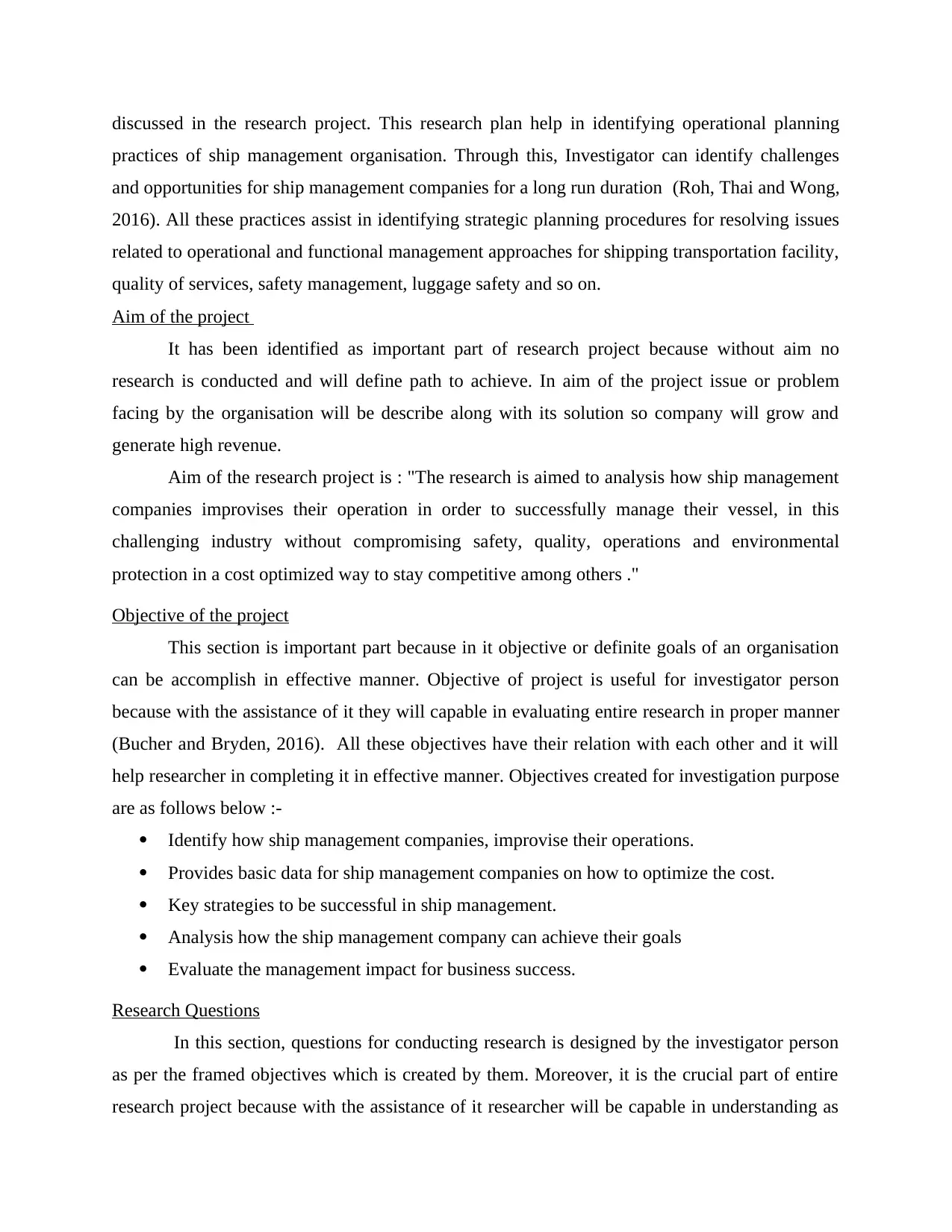
discussed in the research project. This research plan help in identifying operational planning
practices of ship management organisation. Through this, Investigator can identify challenges
and opportunities for ship management companies for a long run duration (Roh, Thai and Wong,
2016). All these practices assist in identifying strategic planning procedures for resolving issues
related to operational and functional management approaches for shipping transportation facility,
quality of services, safety management, luggage safety and so on.
Aim of the project
It has been identified as important part of research project because without aim no
research is conducted and will define path to achieve. In aim of the project issue or problem
facing by the organisation will be describe along with its solution so company will grow and
generate high revenue.
Aim of the research project is : "The research is aimed to analysis how ship management
companies improvises their operation in order to successfully manage their vessel, in this
challenging industry without compromising safety, quality, operations and environmental
protection in a cost optimized way to stay competitive among others ."
Objective of the project
This section is important part because in it objective or definite goals of an organisation
can be accomplish in effective manner. Objective of project is useful for investigator person
because with the assistance of it they will capable in evaluating entire research in proper manner
(Bucher and Bryden, 2016). All these objectives have their relation with each other and it will
help researcher in completing it in effective manner. Objectives created for investigation purpose
are as follows below :-
Identify how ship management companies, improvise their operations.
Provides basic data for ship management companies on how to optimize the cost.
Key strategies to be successful in ship management.
Analysis how the ship management company can achieve their goals
Evaluate the management impact for business success.
Research Questions
In this section, questions for conducting research is designed by the investigator person
as per the framed objectives which is created by them. Moreover, it is the crucial part of entire
research project because with the assistance of it researcher will be capable in understanding as
practices of ship management organisation. Through this, Investigator can identify challenges
and opportunities for ship management companies for a long run duration (Roh, Thai and Wong,
2016). All these practices assist in identifying strategic planning procedures for resolving issues
related to operational and functional management approaches for shipping transportation facility,
quality of services, safety management, luggage safety and so on.
Aim of the project
It has been identified as important part of research project because without aim no
research is conducted and will define path to achieve. In aim of the project issue or problem
facing by the organisation will be describe along with its solution so company will grow and
generate high revenue.
Aim of the research project is : "The research is aimed to analysis how ship management
companies improvises their operation in order to successfully manage their vessel, in this
challenging industry without compromising safety, quality, operations and environmental
protection in a cost optimized way to stay competitive among others ."
Objective of the project
This section is important part because in it objective or definite goals of an organisation
can be accomplish in effective manner. Objective of project is useful for investigator person
because with the assistance of it they will capable in evaluating entire research in proper manner
(Bucher and Bryden, 2016). All these objectives have their relation with each other and it will
help researcher in completing it in effective manner. Objectives created for investigation purpose
are as follows below :-
Identify how ship management companies, improvise their operations.
Provides basic data for ship management companies on how to optimize the cost.
Key strategies to be successful in ship management.
Analysis how the ship management company can achieve their goals
Evaluate the management impact for business success.
Research Questions
In this section, questions for conducting research is designed by the investigator person
as per the framed objectives which is created by them. Moreover, it is the crucial part of entire
research project because with the assistance of it researcher will be capable in understanding as
⊘ This is a preview!⊘
Do you want full access?
Subscribe today to unlock all pages.

Trusted by 1+ million students worldwide
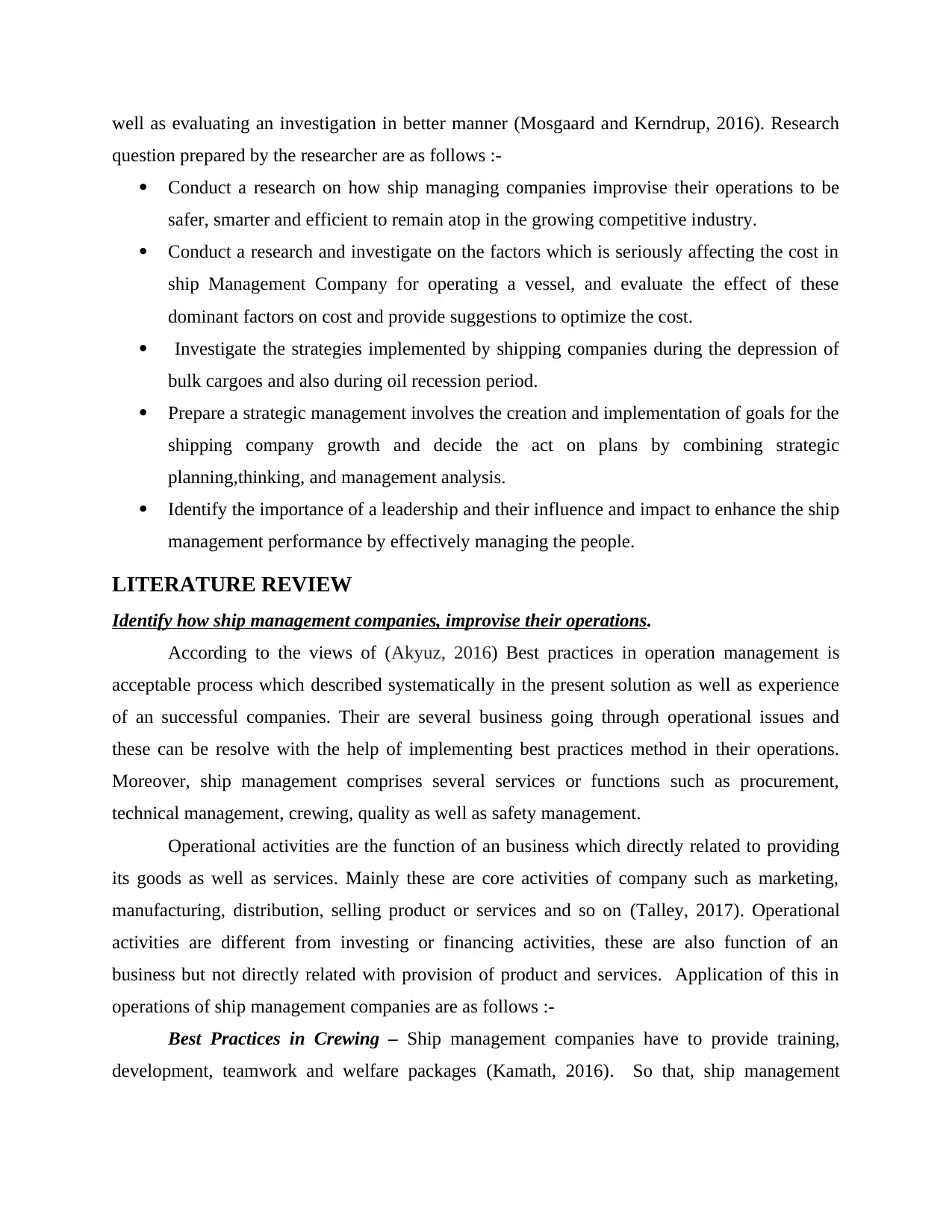
well as evaluating an investigation in better manner (Mosgaard and Kerndrup, 2016). Research
question prepared by the researcher are as follows :-
Conduct a research on how ship managing companies improvise their operations to be
safer, smarter and efficient to remain atop in the growing competitive industry.
Conduct a research and investigate on the factors which is seriously affecting the cost in
ship Management Company for operating a vessel, and evaluate the effect of these
dominant factors on cost and provide suggestions to optimize the cost.
Investigate the strategies implemented by shipping companies during the depression of
bulk cargoes and also during oil recession period.
Prepare a strategic management involves the creation and implementation of goals for the
shipping company growth and decide the act on plans by combining strategic
planning,thinking, and management analysis.
Identify the importance of a leadership and their influence and impact to enhance the ship
management performance by effectively managing the people.
LITERATURE REVIEW
Identify how ship management companies, improvise their operations.
According to the views of (Akyuz, 2016) Best practices in operation management is
acceptable process which described systematically in the present solution as well as experience
of an successful companies. Their are several business going through operational issues and
these can be resolve with the help of implementing best practices method in their operations.
Moreover, ship management comprises several services or functions such as procurement,
technical management, crewing, quality as well as safety management.
Operational activities are the function of an business which directly related to providing
its goods as well as services. Mainly these are core activities of company such as marketing,
manufacturing, distribution, selling product or services and so on (Talley, 2017). Operational
activities are different from investing or financing activities, these are also function of an
business but not directly related with provision of product and services. Application of this in
operations of ship management companies are as follows :-
Best Practices in Crewing – Ship management companies have to provide training,
development, teamwork and welfare packages (Kamath, 2016). So that, ship management
question prepared by the researcher are as follows :-
Conduct a research on how ship managing companies improvise their operations to be
safer, smarter and efficient to remain atop in the growing competitive industry.
Conduct a research and investigate on the factors which is seriously affecting the cost in
ship Management Company for operating a vessel, and evaluate the effect of these
dominant factors on cost and provide suggestions to optimize the cost.
Investigate the strategies implemented by shipping companies during the depression of
bulk cargoes and also during oil recession period.
Prepare a strategic management involves the creation and implementation of goals for the
shipping company growth and decide the act on plans by combining strategic
planning,thinking, and management analysis.
Identify the importance of a leadership and their influence and impact to enhance the ship
management performance by effectively managing the people.
LITERATURE REVIEW
Identify how ship management companies, improvise their operations.
According to the views of (Akyuz, 2016) Best practices in operation management is
acceptable process which described systematically in the present solution as well as experience
of an successful companies. Their are several business going through operational issues and
these can be resolve with the help of implementing best practices method in their operations.
Moreover, ship management comprises several services or functions such as procurement,
technical management, crewing, quality as well as safety management.
Operational activities are the function of an business which directly related to providing
its goods as well as services. Mainly these are core activities of company such as marketing,
manufacturing, distribution, selling product or services and so on (Talley, 2017). Operational
activities are different from investing or financing activities, these are also function of an
business but not directly related with provision of product and services. Application of this in
operations of ship management companies are as follows :-
Best Practices in Crewing – Ship management companies have to provide training,
development, teamwork and welfare packages (Kamath, 2016). So that, ship management
Paraphrase This Document
Need a fresh take? Get an instant paraphrase of this document with our AI Paraphraser
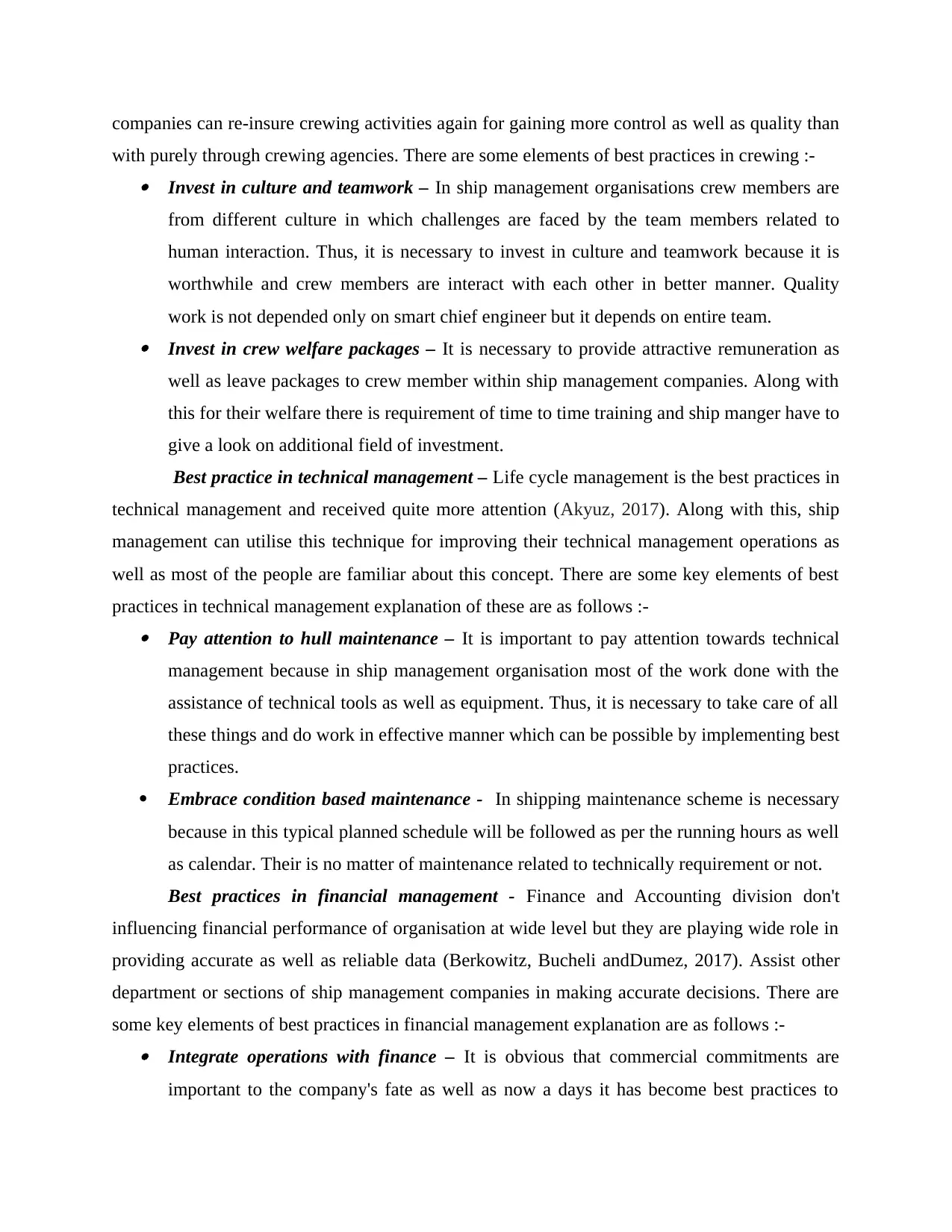
companies can re-insure crewing activities again for gaining more control as well as quality than
with purely through crewing agencies. There are some elements of best practices in crewing :- Invest in culture and teamwork – In ship management organisations crew members are
from different culture in which challenges are faced by the team members related to
human interaction. Thus, it is necessary to invest in culture and teamwork because it is
worthwhile and crew members are interact with each other in better manner. Quality
work is not depended only on smart chief engineer but it depends on entire team. Invest in crew welfare packages – It is necessary to provide attractive remuneration as
well as leave packages to crew member within ship management companies. Along with
this for their welfare there is requirement of time to time training and ship manger have to
give a look on additional field of investment.
Best practice in technical management – Life cycle management is the best practices in
technical management and received quite more attention (Akyuz, 2017). Along with this, ship
management can utilise this technique for improving their technical management operations as
well as most of the people are familiar about this concept. There are some key elements of best
practices in technical management explanation of these are as follows :- Pay attention to hull maintenance – It is important to pay attention towards technical
management because in ship management organisation most of the work done with the
assistance of technical tools as well as equipment. Thus, it is necessary to take care of all
these things and do work in effective manner which can be possible by implementing best
practices.
Embrace condition based maintenance - In shipping maintenance scheme is necessary
because in this typical planned schedule will be followed as per the running hours as well
as calendar. Their is no matter of maintenance related to technically requirement or not.
Best practices in financial management - Finance and Accounting division don't
influencing financial performance of organisation at wide level but they are playing wide role in
providing accurate as well as reliable data (Berkowitz, Bucheli andDumez, 2017). Assist other
department or sections of ship management companies in making accurate decisions. There are
some key elements of best practices in financial management explanation are as follows :- Integrate operations with finance – It is obvious that commercial commitments are
important to the company's fate as well as now a days it has become best practices to
with purely through crewing agencies. There are some elements of best practices in crewing :- Invest in culture and teamwork – In ship management organisations crew members are
from different culture in which challenges are faced by the team members related to
human interaction. Thus, it is necessary to invest in culture and teamwork because it is
worthwhile and crew members are interact with each other in better manner. Quality
work is not depended only on smart chief engineer but it depends on entire team. Invest in crew welfare packages – It is necessary to provide attractive remuneration as
well as leave packages to crew member within ship management companies. Along with
this for their welfare there is requirement of time to time training and ship manger have to
give a look on additional field of investment.
Best practice in technical management – Life cycle management is the best practices in
technical management and received quite more attention (Akyuz, 2017). Along with this, ship
management can utilise this technique for improving their technical management operations as
well as most of the people are familiar about this concept. There are some key elements of best
practices in technical management explanation of these are as follows :- Pay attention to hull maintenance – It is important to pay attention towards technical
management because in ship management organisation most of the work done with the
assistance of technical tools as well as equipment. Thus, it is necessary to take care of all
these things and do work in effective manner which can be possible by implementing best
practices.
Embrace condition based maintenance - In shipping maintenance scheme is necessary
because in this typical planned schedule will be followed as per the running hours as well
as calendar. Their is no matter of maintenance related to technically requirement or not.
Best practices in financial management - Finance and Accounting division don't
influencing financial performance of organisation at wide level but they are playing wide role in
providing accurate as well as reliable data (Berkowitz, Bucheli andDumez, 2017). Assist other
department or sections of ship management companies in making accurate decisions. There are
some key elements of best practices in financial management explanation are as follows :- Integrate operations with finance – It is obvious that commercial commitments are
important to the company's fate as well as now a days it has become best practices to
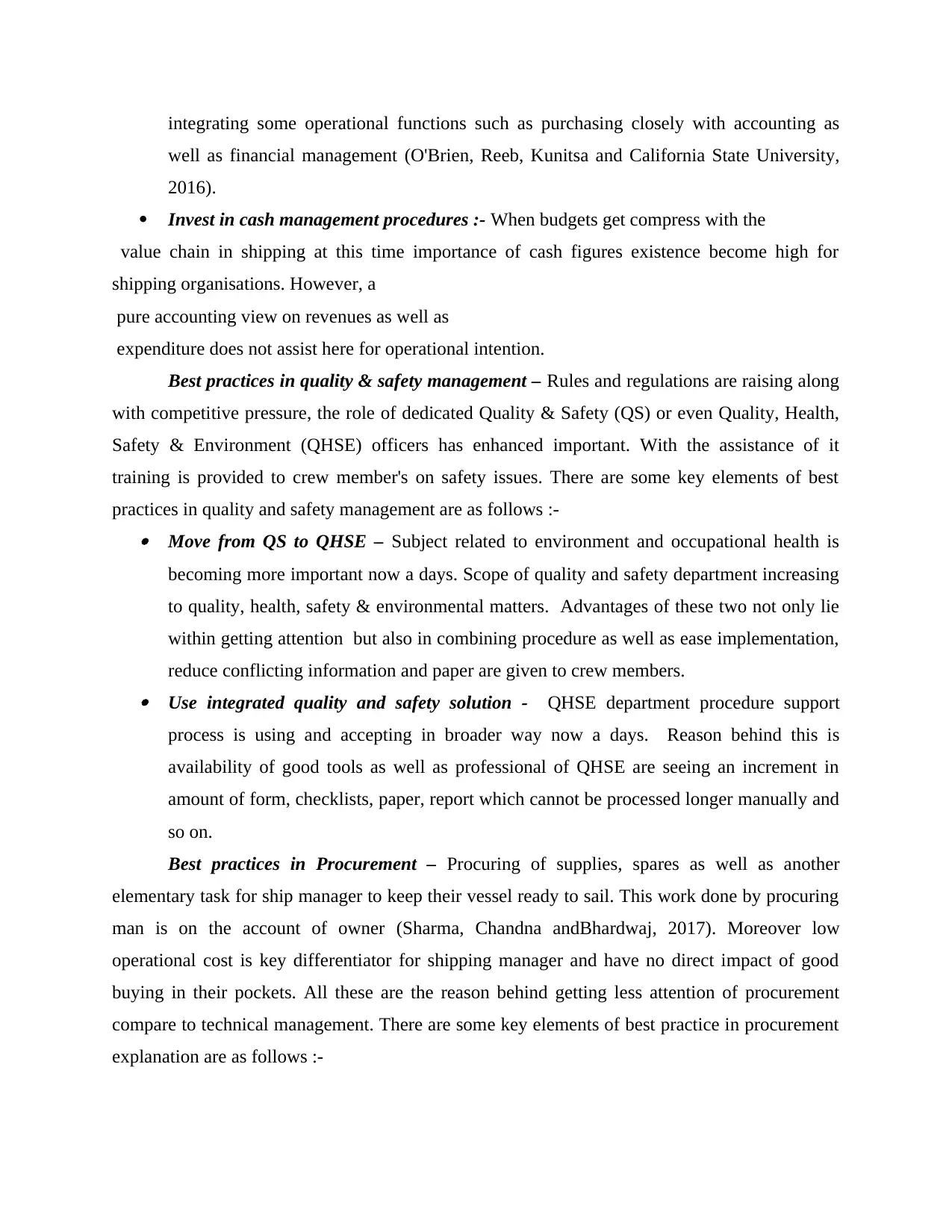
integrating some operational functions such as purchasing closely with accounting as
well as financial management (O'Brien, Reeb, Kunitsa and California State University,
2016).
Invest in cash management procedures :- When budgets get compress with the
value chain in shipping at this time importance of cash figures existence become high for
shipping organisations. However, a
pure accounting view on revenues as well as
expenditure does not assist here for operational intention.
Best practices in quality & safety management – Rules and regulations are raising along
with competitive pressure, the role of dedicated Quality & Safety (QS) or even Quality, Health,
Safety & Environment (QHSE) officers has enhanced important. With the assistance of it
training is provided to crew member's on safety issues. There are some key elements of best
practices in quality and safety management are as follows :- Move from QS to QHSE – Subject related to environment and occupational health is
becoming more important now a days. Scope of quality and safety department increasing
to quality, health, safety & environmental matters. Advantages of these two not only lie
within getting attention but also in combining procedure as well as ease implementation,
reduce conflicting information and paper are given to crew members. Use integrated quality and safety solution - QHSE department procedure support
process is using and accepting in broader way now a days. Reason behind this is
availability of good tools as well as professional of QHSE are seeing an increment in
amount of form, checklists, paper, report which cannot be processed longer manually and
so on.
Best practices in Procurement – Procuring of supplies, spares as well as another
elementary task for ship manager to keep their vessel ready to sail. This work done by procuring
man is on the account of owner (Sharma, Chandna andBhardwaj, 2017). Moreover low
operational cost is key differentiator for shipping manager and have no direct impact of good
buying in their pockets. All these are the reason behind getting less attention of procurement
compare to technical management. There are some key elements of best practice in procurement
explanation are as follows :-
well as financial management (O'Brien, Reeb, Kunitsa and California State University,
2016).
Invest in cash management procedures :- When budgets get compress with the
value chain in shipping at this time importance of cash figures existence become high for
shipping organisations. However, a
pure accounting view on revenues as well as
expenditure does not assist here for operational intention.
Best practices in quality & safety management – Rules and regulations are raising along
with competitive pressure, the role of dedicated Quality & Safety (QS) or even Quality, Health,
Safety & Environment (QHSE) officers has enhanced important. With the assistance of it
training is provided to crew member's on safety issues. There are some key elements of best
practices in quality and safety management are as follows :- Move from QS to QHSE – Subject related to environment and occupational health is
becoming more important now a days. Scope of quality and safety department increasing
to quality, health, safety & environmental matters. Advantages of these two not only lie
within getting attention but also in combining procedure as well as ease implementation,
reduce conflicting information and paper are given to crew members. Use integrated quality and safety solution - QHSE department procedure support
process is using and accepting in broader way now a days. Reason behind this is
availability of good tools as well as professional of QHSE are seeing an increment in
amount of form, checklists, paper, report which cannot be processed longer manually and
so on.
Best practices in Procurement – Procuring of supplies, spares as well as another
elementary task for ship manager to keep their vessel ready to sail. This work done by procuring
man is on the account of owner (Sharma, Chandna andBhardwaj, 2017). Moreover low
operational cost is key differentiator for shipping manager and have no direct impact of good
buying in their pockets. All these are the reason behind getting less attention of procurement
compare to technical management. There are some key elements of best practice in procurement
explanation are as follows :-
⊘ This is a preview!⊘
Do you want full access?
Subscribe today to unlock all pages.

Trusted by 1+ million students worldwide
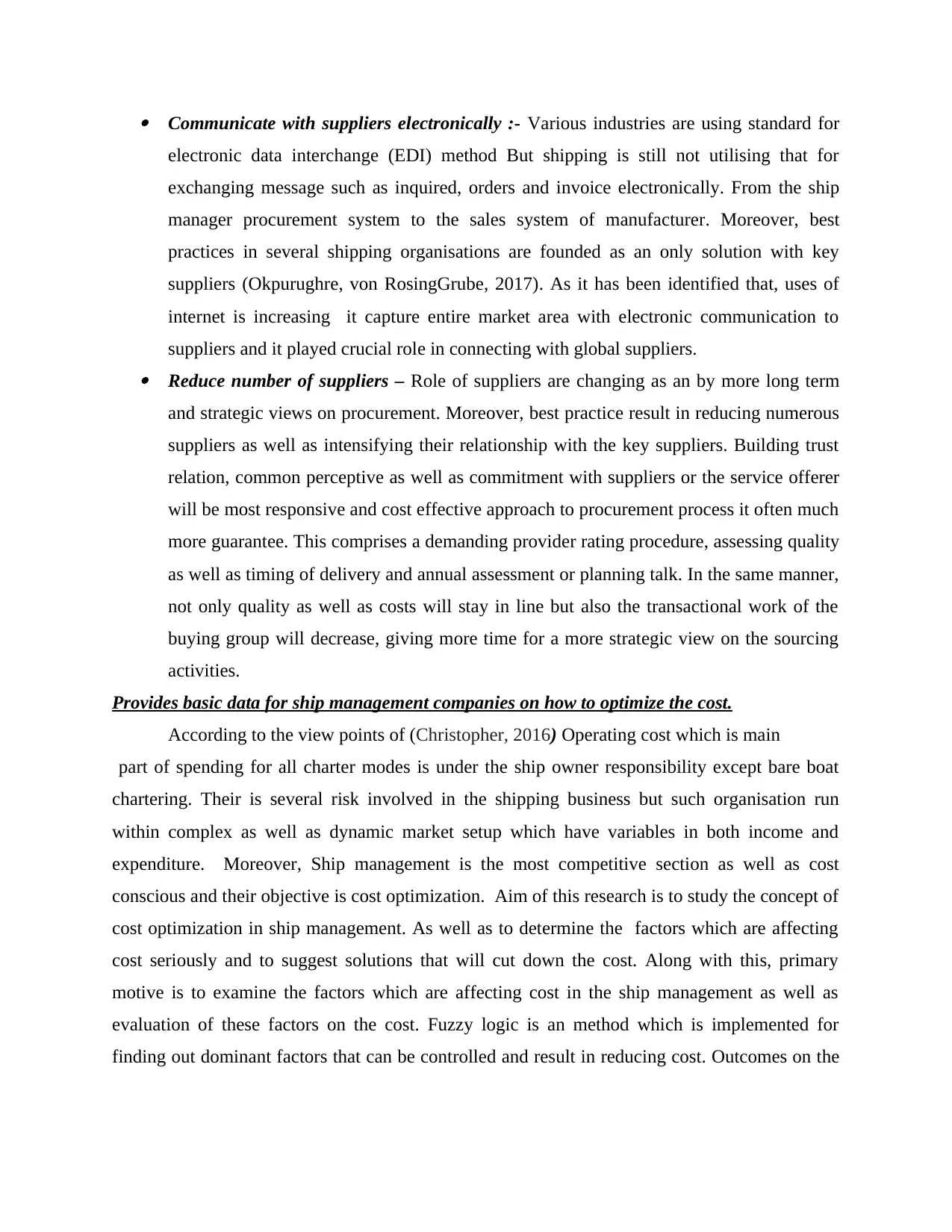
Communicate with suppliers electronically :- Various industries are using standard for
electronic data interchange (EDI) method But shipping is still not utilising that for
exchanging message such as inquired, orders and invoice electronically. From the ship
manager procurement system to the sales system of manufacturer. Moreover, best
practices in several shipping organisations are founded as an only solution with key
suppliers (Okpurughre, von RosingGrube, 2017). As it has been identified that, uses of
internet is increasing it capture entire market area with electronic communication to
suppliers and it played crucial role in connecting with global suppliers. Reduce number of suppliers – Role of suppliers are changing as an by more long term
and strategic views on procurement. Moreover, best practice result in reducing numerous
suppliers as well as intensifying their relationship with the key suppliers. Building trust
relation, common perceptive as well as commitment with suppliers or the service offerer
will be most responsive and cost effective approach to procurement process it often much
more guarantee. This comprises a demanding provider rating procedure, assessing quality
as well as timing of delivery and annual assessment or planning talk. In the same manner,
not only quality as well as costs will stay in line but also the transactional work of the
buying group will decrease, giving more time for a more strategic view on the sourcing
activities.
Provides basic data for ship management companies on how to optimize the cost.
According to the view points of (Christopher, 2016) Operating cost which is main
part of spending for all charter modes is under the ship owner responsibility except bare boat
chartering. Their is several risk involved in the shipping business but such organisation run
within complex as well as dynamic market setup which have variables in both income and
expenditure. Moreover, Ship management is the most competitive section as well as cost
conscious and their objective is cost optimization. Aim of this research is to study the concept of
cost optimization in ship management. As well as to determine the factors which are affecting
cost seriously and to suggest solutions that will cut down the cost. Along with this, primary
motive is to examine the factors which are affecting cost in the ship management as well as
evaluation of these factors on the cost. Fuzzy logic is an method which is implemented for
finding out dominant factors that can be controlled and result in reducing cost. Outcomes on the
electronic data interchange (EDI) method But shipping is still not utilising that for
exchanging message such as inquired, orders and invoice electronically. From the ship
manager procurement system to the sales system of manufacturer. Moreover, best
practices in several shipping organisations are founded as an only solution with key
suppliers (Okpurughre, von RosingGrube, 2017). As it has been identified that, uses of
internet is increasing it capture entire market area with electronic communication to
suppliers and it played crucial role in connecting with global suppliers. Reduce number of suppliers – Role of suppliers are changing as an by more long term
and strategic views on procurement. Moreover, best practice result in reducing numerous
suppliers as well as intensifying their relationship with the key suppliers. Building trust
relation, common perceptive as well as commitment with suppliers or the service offerer
will be most responsive and cost effective approach to procurement process it often much
more guarantee. This comprises a demanding provider rating procedure, assessing quality
as well as timing of delivery and annual assessment or planning talk. In the same manner,
not only quality as well as costs will stay in line but also the transactional work of the
buying group will decrease, giving more time for a more strategic view on the sourcing
activities.
Provides basic data for ship management companies on how to optimize the cost.
According to the view points of (Christopher, 2016) Operating cost which is main
part of spending for all charter modes is under the ship owner responsibility except bare boat
chartering. Their is several risk involved in the shipping business but such organisation run
within complex as well as dynamic market setup which have variables in both income and
expenditure. Moreover, Ship management is the most competitive section as well as cost
conscious and their objective is cost optimization. Aim of this research is to study the concept of
cost optimization in ship management. As well as to determine the factors which are affecting
cost seriously and to suggest solutions that will cut down the cost. Along with this, primary
motive is to examine the factors which are affecting cost in the ship management as well as
evaluation of these factors on the cost. Fuzzy logic is an method which is implemented for
finding out dominant factors that can be controlled and result in reducing cost. Outcomes on the
Paraphrase This Document
Need a fresh take? Get an instant paraphrase of this document with our AI Paraphraser
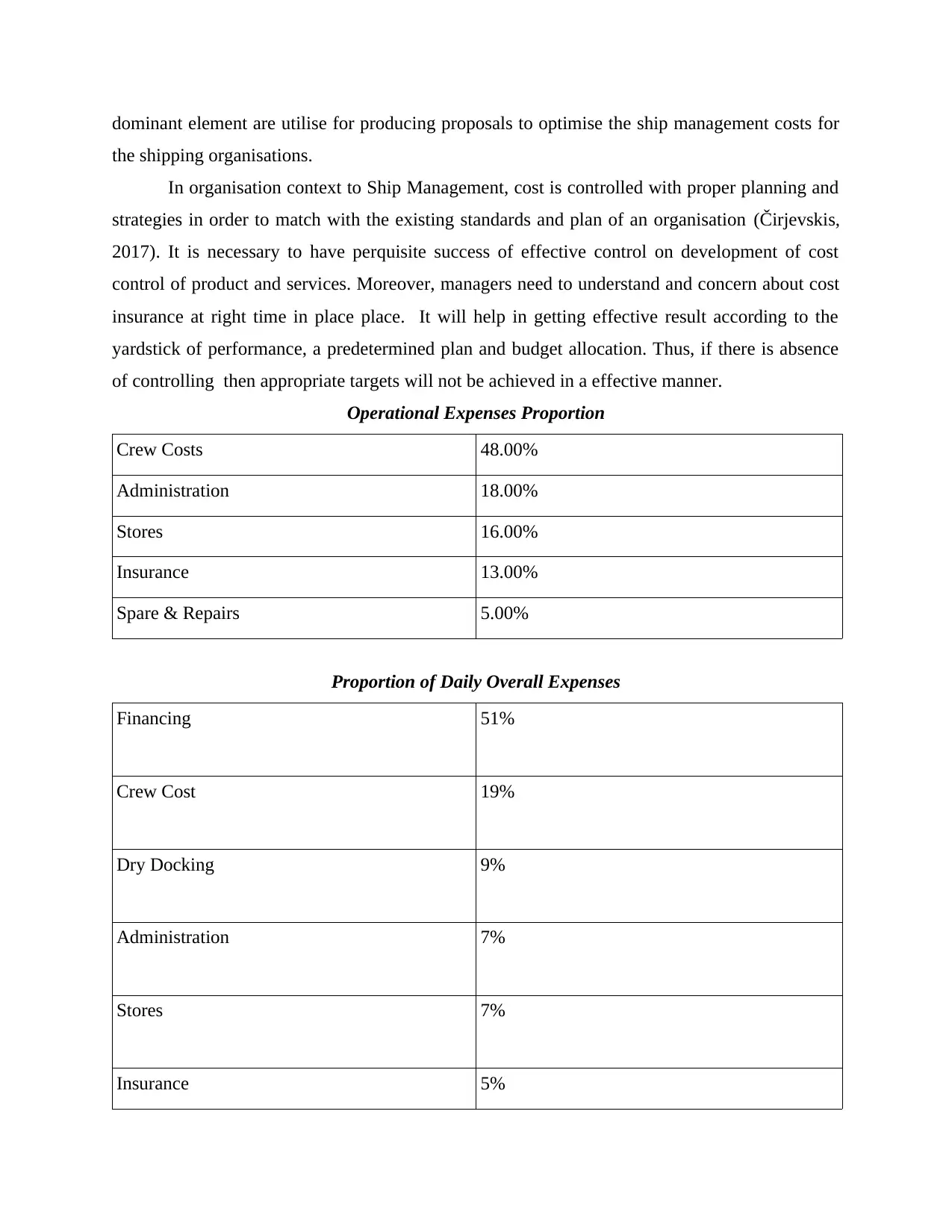
dominant element are utilise for producing proposals to optimise the ship management costs for
the shipping organisations.
In organisation context to Ship Management, cost is controlled with proper planning and
strategies in order to match with the existing standards and plan of an organisation (Čirjevskis,
2017). It is necessary to have perquisite success of effective control on development of cost
control of product and services. Moreover, managers need to understand and concern about cost
insurance at right time in place place. It will help in getting effective result according to the
yardstick of performance, a predetermined plan and budget allocation. Thus, if there is absence
of controlling then appropriate targets will not be achieved in a effective manner.
Operational Expenses Proportion
Crew Costs 48.00%
Administration 18.00%
Stores 16.00%
Insurance 13.00%
Spare & Repairs 5.00%
Proportion of Daily Overall Expenses
Financing 51%
Crew Cost 19%
Dry Docking 9%
Administration 7%
Stores 7%
Insurance 5%
the shipping organisations.
In organisation context to Ship Management, cost is controlled with proper planning and
strategies in order to match with the existing standards and plan of an organisation (Čirjevskis,
2017). It is necessary to have perquisite success of effective control on development of cost
control of product and services. Moreover, managers need to understand and concern about cost
insurance at right time in place place. It will help in getting effective result according to the
yardstick of performance, a predetermined plan and budget allocation. Thus, if there is absence
of controlling then appropriate targets will not be achieved in a effective manner.
Operational Expenses Proportion
Crew Costs 48.00%
Administration 18.00%
Stores 16.00%
Insurance 13.00%
Spare & Repairs 5.00%
Proportion of Daily Overall Expenses
Financing 51%
Crew Cost 19%
Dry Docking 9%
Administration 7%
Stores 7%
Insurance 5%
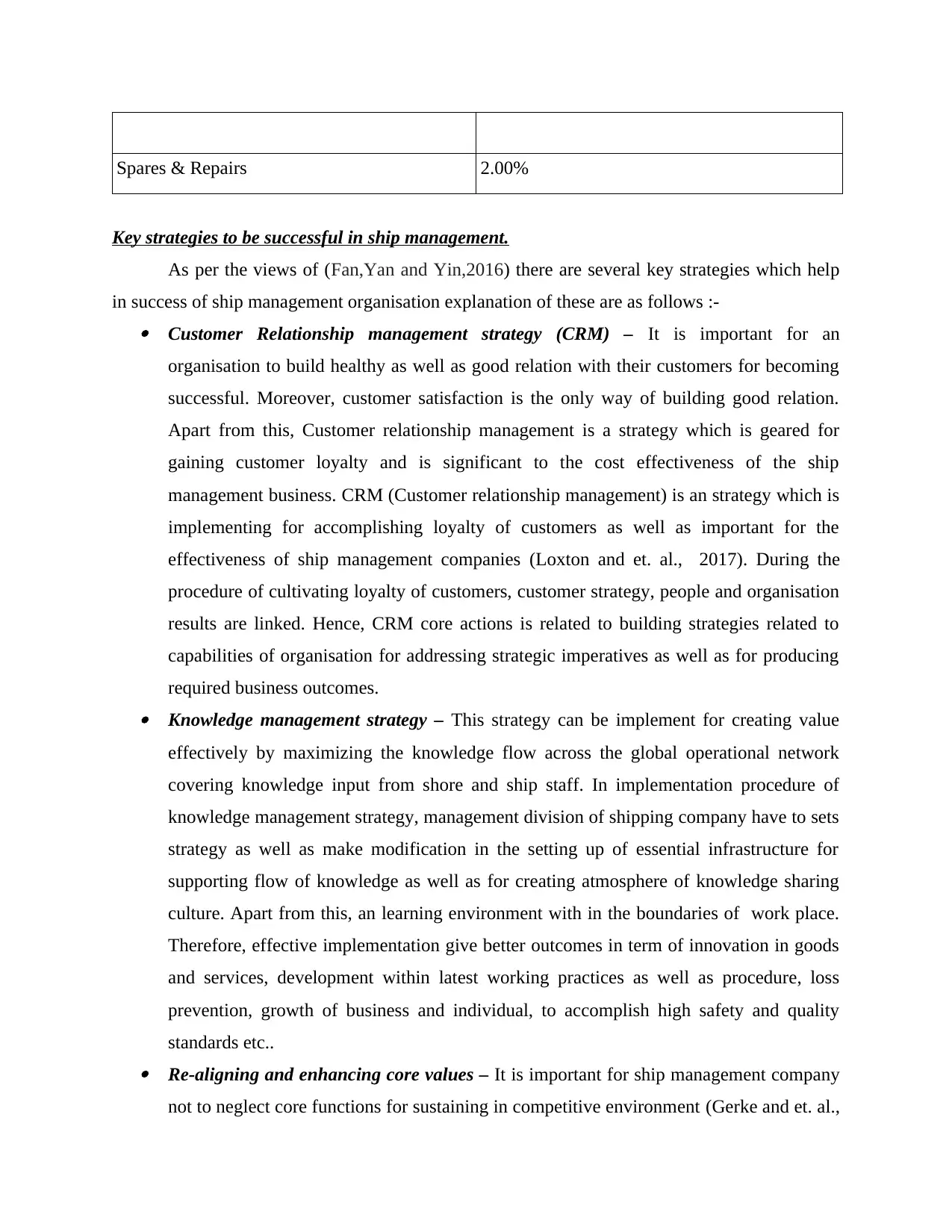
Spares & Repairs 2.00%
Key strategies to be successful in ship management.
As per the views of (Fan,Yan and Yin,2016) there are several key strategies which help
in success of ship management organisation explanation of these are as follows :- Customer Relationship management strategy (CRM) – It is important for an
organisation to build healthy as well as good relation with their customers for becoming
successful. Moreover, customer satisfaction is the only way of building good relation.
Apart from this, Customer relationship management is a strategy which is geared for
gaining customer loyalty and is significant to the cost effectiveness of the ship
management business. CRM (Customer relationship management) is an strategy which is
implementing for accomplishing loyalty of customers as well as important for the
effectiveness of ship management companies (Loxton and et. al., 2017). During the
procedure of cultivating loyalty of customers, customer strategy, people and organisation
results are linked. Hence, CRM core actions is related to building strategies related to
capabilities of organisation for addressing strategic imperatives as well as for producing
required business outcomes. Knowledge management strategy – This strategy can be implement for creating value
effectively by maximizing the knowledge flow across the global operational network
covering knowledge input from shore and ship staff. In implementation procedure of
knowledge management strategy, management division of shipping company have to sets
strategy as well as make modification in the setting up of essential infrastructure for
supporting flow of knowledge as well as for creating atmosphere of knowledge sharing
culture. Apart from this, an learning environment with in the boundaries of work place.
Therefore, effective implementation give better outcomes in term of innovation in goods
and services, development within latest working practices as well as procedure, loss
prevention, growth of business and individual, to accomplish high safety and quality
standards etc.. Re-aligning and enhancing core values – It is important for ship management company
not to neglect core functions for sustaining in competitive environment (Gerke and et. al.,
Key strategies to be successful in ship management.
As per the views of (Fan,Yan and Yin,2016) there are several key strategies which help
in success of ship management organisation explanation of these are as follows :- Customer Relationship management strategy (CRM) – It is important for an
organisation to build healthy as well as good relation with their customers for becoming
successful. Moreover, customer satisfaction is the only way of building good relation.
Apart from this, Customer relationship management is a strategy which is geared for
gaining customer loyalty and is significant to the cost effectiveness of the ship
management business. CRM (Customer relationship management) is an strategy which is
implementing for accomplishing loyalty of customers as well as important for the
effectiveness of ship management companies (Loxton and et. al., 2017). During the
procedure of cultivating loyalty of customers, customer strategy, people and organisation
results are linked. Hence, CRM core actions is related to building strategies related to
capabilities of organisation for addressing strategic imperatives as well as for producing
required business outcomes. Knowledge management strategy – This strategy can be implement for creating value
effectively by maximizing the knowledge flow across the global operational network
covering knowledge input from shore and ship staff. In implementation procedure of
knowledge management strategy, management division of shipping company have to sets
strategy as well as make modification in the setting up of essential infrastructure for
supporting flow of knowledge as well as for creating atmosphere of knowledge sharing
culture. Apart from this, an learning environment with in the boundaries of work place.
Therefore, effective implementation give better outcomes in term of innovation in goods
and services, development within latest working practices as well as procedure, loss
prevention, growth of business and individual, to accomplish high safety and quality
standards etc.. Re-aligning and enhancing core values – It is important for ship management company
not to neglect core functions for sustaining in competitive environment (Gerke and et. al.,
⊘ This is a preview!⊘
Do you want full access?
Subscribe today to unlock all pages.

Trusted by 1+ million students worldwide
1 out of 43
Related Documents
Your All-in-One AI-Powered Toolkit for Academic Success.
+13062052269
info@desklib.com
Available 24*7 on WhatsApp / Email
![[object Object]](/_next/static/media/star-bottom.7253800d.svg)
Unlock your academic potential
Copyright © 2020–2026 A2Z Services. All Rights Reserved. Developed and managed by ZUCOL.



